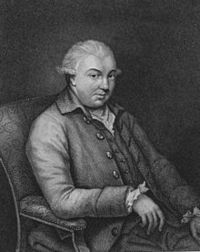Biography:Thomas Alexander Erskine: Difference between revisions
No edit summary |
m (Text replacement - "garamond, serif" to "sans-serif") |
||
| Line 11: | Line 11: | ||
=== Biographical notes === | === Biographical notes === | ||
---- | ---- | ||
<p><font face=" | <p><font face="sans-serif" size="4"> | ||
Thomas Alexander Erskine, Sixth Earl of Kelly, received an early musical education in Scotland and later studied with Johann Stamitz on his sojourn to the Continent from 1753 to 1756, where he came under the influence of the Mannheim School of composition. He was regarded in his lifetime as one of Scotland's premier musicians and composers, and his music was published and played with great success. Charles Burney said of him: | Thomas Alexander Erskine, Sixth Earl of Kelly, received an early musical education in Scotland and later studied with Johann Stamitz on his sojourn to the Continent from 1753 to 1756, where he came under the influence of the Mannheim School of composition. He was regarded in his lifetime as one of Scotland's premier musicians and composers, and his music was published and played with great success. Charles Burney said of him: | ||
<blockquote> | <blockquote> | ||
Revision as of 10:59, 6 May 2019
Thomas Alexander Erskine
| |
|---|---|
| Given name: | Thomas |
| Middle name: | Alexander |
| Family name: | Erskine |
| Place of birth: | Castle Kellie, East Neuk of Fife, Scotland |
| Place of death: | |
| Year of birth: | 1732 |
| Year of death: | 1781 |
| Profile: | Composer, Musician |
| Source of information: | |
Biographical notes
Thomas Alexander Erskine, Sixth Earl of Kelly, received an early musical education in Scotland and later studied with Johann Stamitz on his sojourn to the Continent from 1753 to 1756, where he came under the influence of the Mannheim School of composition. He was regarded in his lifetime as one of Scotland's premier musicians and composers, and his music was published and played with great success. Charles Burney said of him:
The late Earl of Kelly was possessed of more musical science than any dilettante with whom I was ever acquainted...Indeed, he had a strength of hand on the violin, and a genius for composition, with which few professors are gifted.
Kelly was a member of the nascent Edinburgh Music Society, serving as a committee member upon his return from his 'Grand Tour', from 1757 onwards. His title and aristocratic status certainly aided his musical career, but as his skills matured he was able to produce sophisticated overtures, symphonies, concertos, string quartets and sinfonias.
